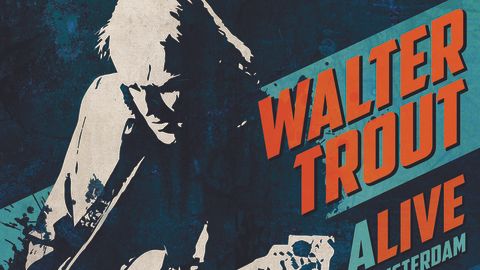
Alive – but only just. Three years ago, Walter Trout was being murdered by his own liver, and even after a last-minute transplant in May 2014, you feared that – to paraphrase the title track of The Blues Came Callin’ – the US bandleader would never be the man he was.
Last year’s Battle Scars was joyous affirmation that Trout could still blow the studio doors off, but you sense it was the associated world tour that meant even more to him, the bluesman routinely sobbing as he took the stage, before strafing crowds with his most vital live performances in years.
It would have been too much pressure for Trout to record last June’s comeback show at the Royal Albert Hall (an event so emotionally charged it could have been sponsored by Kleenex). Alive finds him further up the road, bottled in November at Amsterdam’s Royal Theatre Carré.
Both bandleader and crowd are holding it together, but you still feel a point being made, as Trout bursts out of the traps with a starburst of blistering solo fretwork that hoses the pretenders from his throne.
Trout has never worked to a setlist, and though there’s a few favourites you wish he’d pulled out, this is a stellar, hard-rocking set. The majority of cuts are from Battle Scars, and while it’s a shame that Trout’s spoken-word intros aren’t included, such editing is understandable as he jams each song to the stratosphere. The Beatles-ish Fly Away, in particular, becomes a rampant smash-and-grab. As the bluesman told us: “I almost have a hard time listening to the studio version now. It’s much more laid-back.”
It’s a high-velocity show, but Trout also works the dynamics. Hearing a punter call for Marie’s Mood, he agrees (“We’ll do that, we’re easy”) and launches into that wonderful six-minute instrumental from Positively Beale St. Say Goodbye To The Blues is a neck-tingler, too, its lyric saluting BB King while Trout’s Strat moans like whale song. He also finds time to pull out the benevolent country strummer, The Love That We Once Knew.
By his own admission, Trout struggled through tours in the months before his diagnosis, plagued by hand cramps and dizziness, always keeping one eye on the clock. Here, by contrast, he’s patently enjoying every minute, still gamely shredding when the album fades out around the two-hour mark.
There’s no need to check Trout’s vital signs. This release is all the proof you need that he’s alive and well.


